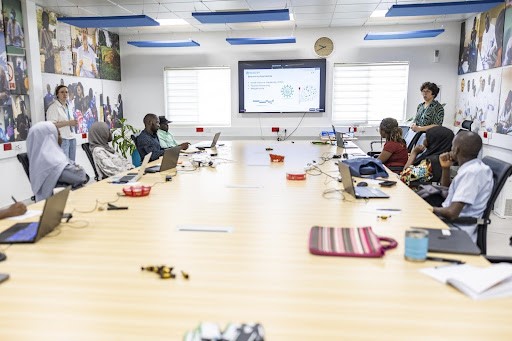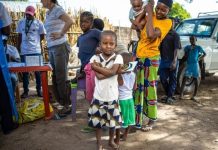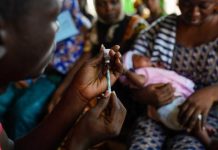The Medical Research Council Unit-The Gambia at the London School of Hygiene and Tropical Medicine (MRCG at LSHTM) recently conducted a four-day Basic Linux training on Bioinformatics for scientists and doctors in collaboration with Robert Koch Institute and the Ministry of Health.
Bringing together ten health professionals from The Gambia who include participants from the Directorate of Public Health Services, Edward Francis Small Teaching Hospital, and the National Public Health Laboratories, the training for scientists and clinicians with expertise in the Next Generation Sequencing (NGS), genomics and public health, provided participants with the skills to navigate Linux systems.
Covering topics such as creating, modifying, and viewing files on the command line, running small scripts for automation, installing and managing bioinformatics tools, and efficient data management, the training developed participants’ understanding of essential bash commands that will empower them to navigate Linux systems. These skills are expected to position them better to interpret crucial scientific data and support them in advancing their bio-informatics skills in the future.
Speaking on the significance of collaborating with MRCG at LSHTM, Ignacio Postigo-Hidalgo, the project manager for Integrated Genomic Surveillance (IGS) at Robert Koch Institut (RKI) said: “The collaboration between the RKI and MRCG at LSHTM is crucial in building foundational bio-informatics skills in the region. This training serves as the groundwork for developing the bio-informatics expertise needed for genomics data analysis. By introducing these fundamental skills, we are laying the foundation for enhanced genomics surveillance capabilities, which are vital for effective disease monitoring and response in the region.”
Dr. Buba Manjang, the Director of Public Health Service at the Ministry of Health emphasised the significance of the training and said: “This reflects the strong collaboration that has long existed between MRCG and the Ministry of Health. The Ministry’s staff will now benefit from this knowledge transfer to enhance their skills for improved service delivery. We are also appreciative of the support from the Robert Koch Institute.”
“The skills gained from this training will enhance our staff’s ability to manage data effectively. This will ensure that the Ministry has the necessary information for informed decision-making and allow us to provide timely updates as needed.”
Abdul Sesay, Head of the Genomics Strategic Core Platform at MRCG at LSHTM, said: “We are already collaborating with RKI on a grant and have established a good relationship.”
“Analysing genomics data generated in The Gambia through the public health systems by public health officials is important for building capacity in the country. The dry lab aspects of the training provided by RKI will be useful to train individuals from the public health sectors, with skills required for them to perform the analysis of molecular/genomics data sets,” he added.
The training is part of MRCG at LSHTM’s larger effort to strengthen the capacities of health professionals in the sub-region, underscoring their commitment to advance public health through improved bioinformatics skills.





















